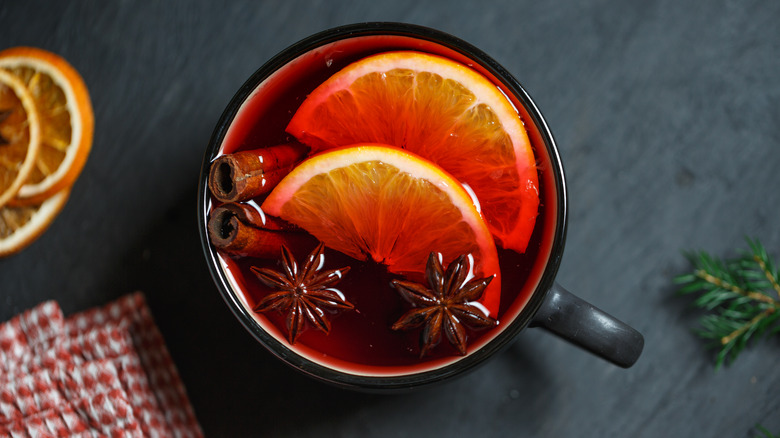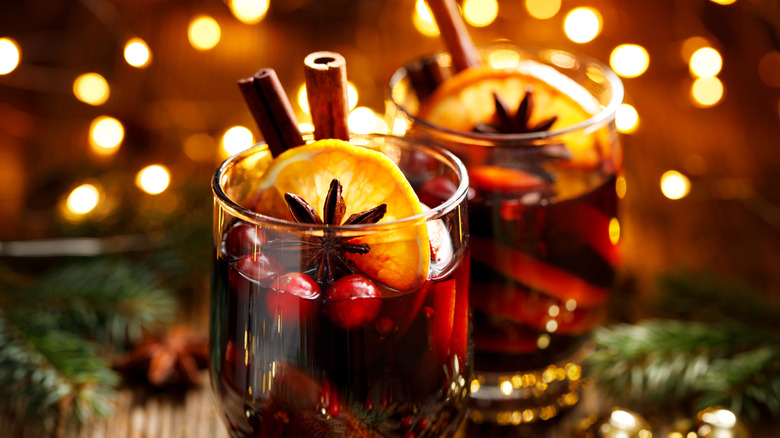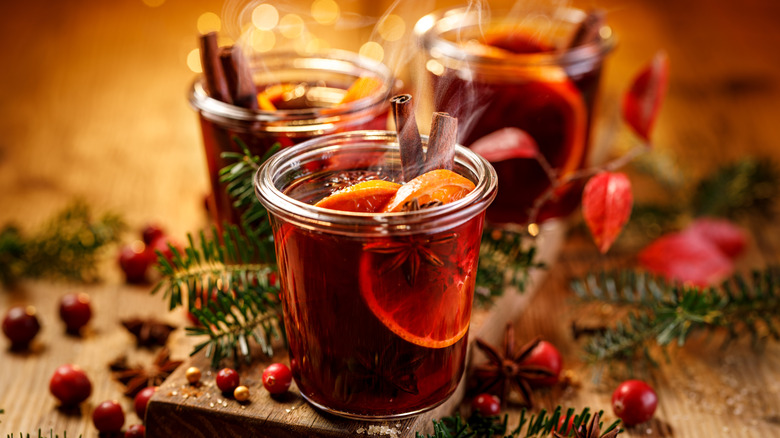What Are The Classic Spices For Mulled Wine?
Mulled wine is a holiday classic, and while there are many variations for this beloved beverage, there seems to be a consistent throughline in every recipe you'll find — the spices. Traditional mulling spices consist of cinnamon, clove, and star anise. Sometimes you'll find mulling spice blends that also include cardamom, ginger, peppercorns, and/or allspice.
Each of these additions bring their own uniqueness and depth to the flavor profile of mulled wine and can be used interchangeably or all at once depending on personal preference. You'll find these spices used in other things like baked goods and teas as well. But whatever their application, it's well-known that this spice combination is deeply connected to the holiday season.
Whether you're preparing a comforting mulled wine recipe, or baking a batch of spiced Christmas cookies for your next holiday party, chances are you'll have some variation of this medley on hand. After all, classics become classics because they're reliably good; people don't pass down traditions and practices if they don't work. So, why have spices like cinnamon, clove, and star anise left such a lasting impression? The answer is a little more scientific (and a tiny bit more magical) than you might think.
The history of mulled wine - and why we love it so much
Mulled wine is an ancient concoction. The Romans may have started it, but medieval Europeans more than likely perfected it. Mulled wine is similar to the Swedish spiced drink Glögg: each employs similar warming spices, but the latter is often an eclectic blend of spirits and wines as well as nuts and fruit, whereas mulled wine is simply spices, oranges, and wine (maybe a little brandy if you're feeling extra festive). Cinnamon and cloves remain star flavors in each drink, making both the perfect wintertime repast.
The National Library of Medicine published a study conducted in 2009 that concluded odors do in fact affect people's sense of the time of year, and that cinnamon was unanimously most associated with Christmas, which is interesting to consider when you remember that people's sense of smell is more closely tied to memory than any other sense. To put it simply, people's innate association with cinnamon and Christmas lies in the childhood memories of Christmases past. It makes sense then why we put cinnamon sticks in our alcoholic beverages as we grow up; maybe the holiday spirit is found in the spirits we drink along the way.
Rely on your sense of smell to know when it's perfectly spiced
Whatever deep Freudian reason causes us to cling to this fragrant melange, there's no denying that mulled wine is plain delicious. Sweet mulling spices compliment bitter orange citrus and mellow the bite of full-bodied red wines perfectly. However, it's important to know that you can, in fact, have too much of a good thing (and we're not just talking about the wine). Over-spicing your mulled drink can result in diminished complexity and leave you with something cloying and sickly. So, you may want to show some restraint when it comes to adding in the spices.
If you're not following a recipe (or the one you're using seems iffy), it's always good advice to follow your nose. Since only 20% of our sense of taste is actually on our tongue, your nose is a good indication of what is too much or too little of any given spice. Cinnamon, clove, and star anise are deeply aromatic — and really, most of our perception of them is in their fragrance since you can't actually taste the spices. Don't believe it? Try holding your nose and see if you can tell a clove from a cardamom when you put them in your mouth. Knowing these tips can help you make the perfect spiced drink this holiday season.


